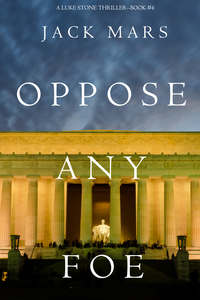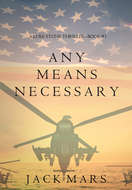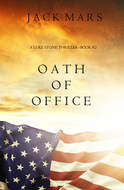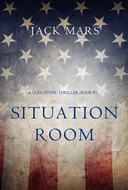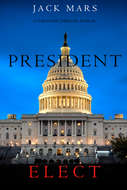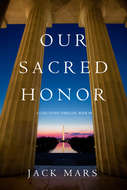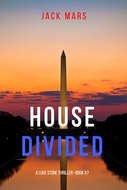Buch lesen: "Oppose Any Foe"
Jack Mars
Jack Mars is author of the bestselling LUKE STONE thriller series, which include the suspense thrillers ANY MEANS NECESSARY (book #1), OATH OF OFFICE (book #2), SITUATION ROOM (book #3), OPPOSE ANY FOE (book #4), and PRESIDENT ELECT (book #5).
Jack loves to hear from you, so please feel free to visit www.Jackmarsauthor.comwww.Jackmarsauthor.com to join the email list, receive a free book, receive free giveaways, connect on Facebook and Twitter, and stay in touch!
Copyright © 2016 by Jack Mars. All rights reserved. Except as permitted under the U.S. Copyright Act of 1976, no part of this publication may be reproduced, distributed or transmitted in any form or by any means, or stored in a database or retrieval system, without the prior permission of the author. This ebook is licensed for your personal enjoyment only. This ebook may not be re-sold or given away to other people. If you would like to share this book with another person, please purchase an additional copy for each recipient. If you’re reading this book and did not purchase it, or it was not purchased for your use only, then please return it and purchase your own copy. Thank you for respecting the hard work of this author. This is a work of fiction. Names, characters, businesses, organizations, places, events, and incidents either are the product of the author’s imagination or are used fictionally. Any resemblance to actual persons, living or dead, is entirely coincidental. Jacket image Copyright Orhan Cam, used under license from Shutterstock.com.
BOOKS BY JACK MARS
LUKE STONE THRILLER SERIES
ANY MEANS NECESSARY (Book #1)
OATH OF OFFICE (Book #2)
SITUATION ROOM (Book #3)
OPPOSE ANY FOE (Book #4)
PRESIDENT ELECT (Book #5)
CHAPTER ONE
October 16
5:25 a.m. Mountain Daylight Time
Marble Canyon
Grand Canyon National Park, Arizona
“They’re coming through on all sides!”
Luke was trying to live until daybreak, but the sun refused to rise. It was cold, and his shirt was off. He had ripped it off in the heat of combat. There was no ammo left.
Turbaned, bearded Taliban fighters poured over the walls of the outpost. Men screamed all around him.
Luke tossed his empty rifle away and pulled his handgun. He fired down the trench on his own position – it was overrun with enemies. A line of them were running this way. More came sliding, falling, jumping over the wall.
Where were his guys? Was anyone still alive?
He killed the closest man with a shot to the face. The head exploded like a cherry tomato. He grabbed the man by his tunic and held him up as a shield. The headless man was light, and Luke was raging with adrenaline – it was if the corpse were an empty suit of clothes.
He killed four men with four shots. He kept firing.
Then he was out of bullets. Again.
A Taliban charged with an AK-47, bayonet attached. Luke pushed the corpse at him, then threw his gun like a tomahawk. It bounced off the man’s head, distracting him for a second. Luke used that time. He stepped into the attack, sliding along the edge of the bayonet. He plunged two fingers deep into the man’s eyes, and pulled.
The man screamed. His hands went to his face. Now Luke had the AK. He bayoneted his enemy in the chest, two, three, four times. He pushed it in deep.
The man breathed his last right into Luke’s face.
Luke’s hands roamed the man’s body. The fresh corpse had a grenade in its breast pocket. Luke took it, pulled it, and tossed it over the rampart into the oncoming hordes.
He hit the deck.
BOOOM.
The explosion was right there, spraying dirt and rock and blood and bone. The sandbagged wall half collapsed on top of him.
Luke clawed his way to his feet, deaf now, his ears ringing. He checked the AK. Empty. But he still had the bayonet.
“Come on, you bastards!” he screamed. “Come on!”
More men came over the wall, and he stabbed them in a frenzy. He ripped and tore at them with his bare hands. He shot them with their own guns.
At some point, the sun rose, but there was no warmth to it. The fighting had stopped somehow – he couldn’t remember when, or how, it had ended. The ground was rugged, and hard. There were dead bodies everywhere. Skinny, bearded men lay all over the ground, with eyes wide and staring.
Nearby, he spotted one crawling back down the hill, trailing a line of blood like the trail of slime that follows a snail. He should really go out there and kill that guy, but he didn’t want to risk being in the open.
Luke’s chest was painted red. He was soaked in the blood of dead men. His body trembled from hunger, and from exhaustion. He stared out at the surrounding mountains, just coming into view.
How many more were out there? How long before they came?
Martinez was sprawled on his back nearby, low in the trench. He was crying. He couldn’t move his legs. He’d had enough. He wanted to die. “Stone,” he said. “Hey, Stone. Hey! Kill me, man. Just kill me. Hey, Stone! Listen to me, man!”
Luke was numb. He had no thoughts about Martinez’s legs, or about Martinez’s future. He was just tired of listening to Martinez’s complaints.
“I’d gladly kill you, Martinez, just for whining like that. But I’m out of ammo. So man up… okay?”
Nearby, Murphy was sitting on an outcropping of rock, staring into space. He wasn’t even trying to take cover.
“Murph! Get down here. You want a sniper to put a bullet in your head?”
Murphy turned and looked at Luke. His eyes were just… gone. He shook his head. An exhalation of air escaped from him. It sounded almost like laughter. He stayed right where he was.
If more Taliban came, they were toast. Neither one of these guys had much fight left in them, and the only weapon Stone still had was the bent bayonet in his hand. For a moment, he thought idly about picking through some of these dead guys for weapons. He didn’t know if he had the strength left to stand. He might have to crawl instead.
As he watched, a line of black insects appeared in the sky far away. He knew what they were in an instant. Helicopters. United States military helicopters, probably Black Hawks. The cavalry was coming. Luke didn’t feel good about that, or bad. He felt nothing. Emptiness was an occupational hazard. He felt nothing at all…
Luke was awakened by his ringing phone. He lay there and blinked.
He tried to orient himself. He was in a tent, he realized, at the bottom of the Grand Canyon.
It was just before first light, and he was in the tent he shared with his son, Gunner. He stared into the black night, listening to the sound of his son’s deep breathing nearby.
His phone kept ringing.
It vibrated against his leg, and made the annoying buzzing sound that phones set to vibrate make. He didn’t want to wake Gunner, but this was probably a call he needed to take. Very few people had this number, and they were people who wouldn’t just call to shoot the breeze.
He glanced at his watch: five thirty a.m.
Luke unzipped the tent, slid out, then zipped it up again. Nearby, in the first pale light of the gathering day, Luke saw the other two tents – Ed Newsam in one, Mark Swann in the other. The remains of last night’s fire were in the circle of stones at the center of the camp – there were still a few coals glowing red.
The air was cool and crisp – Luke wore only boxer shorts and a T-shirt. Goosebumps popped up along his arms and on his legs. He kicked his feet into a pair of sandals and walked down to the river, past where the raft was tied up. He wanted to get far enough away from the campsite so that he didn’t wake anyone.
He sat on a boulder and gazed at the rising walls of the canyon. Just below him, although he could barely see it, was the sound of trickling water. Downriver, maybe half a mile away, he could hear the rushing of the next set of rapids.
He looked at the phone. He knew the number by heart. It was Becca. Probably the last person he wanted to hear from right now. He’d had Gunner for five days, which was perfectly legal, according to their agreement. Yes, Gunner had been out of school during that time, but the kid was some kind of genius – there was talk of him skipping grades, not falling behind.
To Luke’s mind, getting him out into the wild, enjoying nature and testing himself both physically and mentally, was good for him – and probably more important than anything he might get up to at home. Kids nowadays – they spent a lot of time staring into video screens. It had its place – those screens were powerful tools, but let’s limit it to that. Let’s not allow them to take the place of family, physicality, fun, or imagination. Let’s not pretend that real adventure, or even experience, took place inside of a computer.
He called her back, his mind alert, but open. Whatever game she tried to play, he would stay calm and be as reasonable as he could.
The phone rang once.
“Luke?”
“Hi, Becca,” he said, his voice low and friendly, acting like it was the most normal thing in the world to call someone back before sunrise. “How are you?”
“I’m okay,” she said. Her speech with him was always abrupt, tense. His life with her was over – he recognized that. But his life with his son was just beginning, and he was firm that he would navigate any roadblocks she might try to put in his way.
He waited.
“What is Gunner doing?” she said.
“He’s sleeping. It’s still pretty early here. The sun’s not even quite up yet.”
“Right,” she said. “I forgot about the time difference.”
“Don’t worry about it,” he said. “I was awake anyway.” He paused for a few seconds. The first glint of real sun was appearing in the east, a ray of light which peeked over the rim of the canyon and played on the cliff wall to the west, turning it pink and orange.
“So what can I do for you?”
She didn’t hesitate. “I need Gunner to come home right away.”
“Becca – ”
“Don’t fight me on this, Luke. You know it won’t hold any water with the judge. A special operations agent with diagnosed post traumatic stress disorder and a history of violence wants to take his young son on outdoor adventures, which, by the way, causes his son to miss entire weeks of school. I can’t believe I even agreed to this in the first place. I’ve been so distracted that I – ”
He interrupted her. “Becca, we’re in the Grand Canyon. We’re rafting. You do realize that, don’t you? Unless a helicopter lands down here to pick us up, we are probably three days from reaching the South Rim. Then a night in the lodge there, and a full day’s drive down to Phoenix. Which sounds about right, because as I recall it, our plane tickets back are scheduled for the twenty-second. And by the way, this whole PTSD diagnosis isn’t real. It never happened. No doctor has ever even suggested it. It’s just something that you’ve manufactured in your – ”
“Luke, I have cancer.”
That stopped him in his tracks. In recent days, she had been more agitated than he’d ever seen her before. Of course he had noticed this, but mostly ignored it. It was typical of her, and the amount of pressure she put on herself. Becca was a Grade A stress case. But this was different.
Luke’s eyes watered, and a thick lump formed in his throat. Could it be true? Whatever had happened between them, this was the woman he had fallen in love with. This was the woman who had carried his child. At one time, he had loved her more than anything in this world, certainly more than he loved himself.
“Jesus, Becca. I’m so sorry. When did that happen?”
“I was feeling sick all summer. I lost some weight. At first, it was no big deal, but then it became a surprising amount of weight. I thought it was from all the anxiety, everything that’s happened in the past year – the kidnapping, the train crash, all the time you’ve been away. But things have calmed down a lot, and the sickness didn’t stop. I went for tests starting a couple weeks ago. I had been vomiting. I didn’t want to tell you until I knew more. Now I know more. I saw my doctor yesterday, and she told me everything.”
“What is it?” he said, though he was not sure he wanted to hear the answer.
“It’s pancreatic,” she said, dropping perhaps the worst bomb he could have imagined. “Stage Four. Luke, it’s already metastasized. It’s in my colon, in my brain. It’s in my bones…” Her voice trailed off, and he could hear her sob two thousand miles away.
“I’ve been crying all night,” she said, her voice breaking. “I can’t seem to stop.”
As bad as he felt, Luke found that his thoughts suddenly weren’t with her – they were with Gunner. “How long?” he said. “Did they give you a timeframe?”
“Three months,” Becca said. “Maybe six. She told me not to hang my hat on that. A lot of people die very quickly. Sometimes there’s a miracle and the patient lives on and on indefinitely. Either way, she told me I need to get my affairs in order.”
She paused. “Luke, I’m so afraid.”
He nodded. “I know you are. We’ll be there as soon as we can. I’m not going to tell Gunner.”
“Good. I don’t want you to. We can tell him together.”
“Okay,” Luke said. “I’ll see you soon. I’m very sorry.”
The hang-up was awkward. If only they hadn’t been fighting all these months. If only she hadn’t been so hostile to him. If these things hadn’t happened, maybe he could have found a way to comfort her, even from this distance. He had become hardened against her, and he didn’t know if there was any softness left.
He sat on the boulder for several minutes. Light began to fill the sky. He didn’t reminisce about the good memories with her. He didn’t go over all the battles they’d fought this past year, and how vicious and dug in she’d been. His mind was a blank. That was for the best. He needed a way out of this canyon, and he needed to break the news to Ed and Swann that he and Gunner were leaving.
He pushed off the rock and walked back to camp. Ed was awake and crouched by the fire. He had started it up again and had put the coffee pot on. He was shirtless, wearing nothing but a pair of red boxer briefs and flip-flops. His body was thick rippling muscle and ropey veins, hardly an ounce of fat on him – he looked like a martial arts fighter about to enter the cage. He watched Luke approach, then gestured to the west.
Over there, the sky was still cobalt blue, the night retreating, being chased away by the light coming from the east. At the very top, the towering walls of the canyon were lit by a sliver of sun now, setting their striations aflame in red, pink, yellow, and orange.
“Damn, that’s pretty,” Ed said.
“Ed,” Luke said. “I’ve got bad news.”
CHAPTER TWO
9:15 p.m. Greenwich Mean Time (4:15 p.m. Eastern Daylight Time)
Molenbeek Suburb
Brussels, Belgium
The thin man could speak Dutch.
“Ga weg,” he said under his breath. Go away.
His name was not Jamal. But that was the name he sometimes gave to people, and the name that many, many people had come to know him by. Most people called him Jamal. Some called him the Phantom.
He stood in the shadows near an overflowing garbage can, just inside a narrow cobblestone street, smoking a cigarette and watching a police car parked on the main avenue. The street he was on was little more than an alleyway, and as he stood back in the shadows, he felt certain no one could see him there. The empty boulevards and sidewalks and alleys of the infamous Muslim slum were wet from a hard, chilly rain that had stopped maybe ten minutes before.
The place was a ghost town tonight.
On the boulevard, the police car pulled out from the curb and rolled quietly down the street. There was no other traffic.
A tickle of excitement – it was almost fear – went through Jamal’s body as he watched the police. They had no reason to harass him. He wasn’t breaking any laws. He was a well-dressed man in a dark suit and Italian leather shoes, with a clean-shaven face. He could be a businessman, or the owner of these low-rise tenement buildings all around him. He wasn’t the type for the police to randomly stop and search. Even so, Jamal had fallen into the hands of the authorities before – not here in Belgium, but in other places. His experiences were unpleasant, to put it mildly. He had once spent twelve hours listening to himself scream in agony.
He shook his head to clear the dark thoughts, finished his cigarette in three deep inhales, ignored the garbage can, and pitched the butt on the ground. He turned back down the alley. He passed a round red sign with a horizontal white stripe – DO NOT ENTER. The street was too narrow for car traffic. If the police suddenly decided they wanted to pursue him, they’d be forced to do so on foot. Either that, or circle around several blocks. By the time they returned, he’d be gone.
After fifty meters, he turned quickly and unlocked the entrance to a particularly dilapidated building. He climbed a narrow stairwell three stories until it dead-ended at a thick, steel-reinforced door. The stairs were old, made of wood and crazily warped. The whole stairwell seemed to twist this way and that like taffy, giving it the feeling of a carnival funhouse.
Jamal made a fist and hammered on the heavy door, his knocks coming in a careful sequence:
BANG-BANG. BANG-BANG.
He paused a few seconds.
BANG.
A gun-hole slid open and an eye appeared there. The man on the other side grunted as he verified who it was. Jamal listened to the guard turn keys in locks, then remove the steel t-bar wedged into the floor at the bottom of the door. The police would have a very hard time entering this apartment, if their suspicion ever fell upon it.
“As salaam alaikum,” Jamal said as he entered.
“Wa alailkum salaam,” the man who opened the door said. He was a tall, burly man. He wore a grimy sleeveless T-shirt, work pants, and boots. A thick unkempt beard covered his face, meeting the mass of curly black hair on his scalp. His eyes were dull. He was everything the thin man was not.
“How do they seem?” Jamal said in French.
The big man shrugged. “Good, I think.”
Jamal passed through a beaded curtain, down a short hallway, and entered a small room – what would have been the living room if a family were occupying this place. The dingy room was crowded with young men, most wearing T-shirts, jerseys from their favorite European football teams, track pants, and sneakers. It was hot and humid in the room, perhaps from the proximity of all the bodies in a small space. It smelled like wet socks mingled with body odor in there.
In the center of the room, on a wide wooden table, sat a bullet-shaped device made of silver metal. It was about a meter long and less than half a meter wide. Jamal had spent time in Germany and Austria, and the device reminded him of a small beer keg. In fact, except for its weight – it was quite light – it was a very close replica of an American W80 nuclear warhead.
Two young men were at the table while the others circled around and watched. One stood in front of a small laptop computer mounted inside a steel suitcase. The suitcase had a panel which ran alongside the laptop – there were two switches, two LED lights (one red and one green), and a dial built into the panel. A wire ran from the case to another panel along the side of the warhead. The entire device – the suitcase and the laptop inside it – were known as a UC 1583 controller. It was a device designed for one task only – to communicate with a nuclear weapon.
The second man was bent over a white envelope on the table. He wore an expensive digital microscope affixed to his eye, and slowly scanned the envelope, looking for what he knew must be there – a tiny dot, no larger than the period at the end of a sentence, in which there was embedded the code that would arm and activate the warhead.
Jamal moved closer to watch.
The young man with the microscope slowly scanned the envelope. Every few seconds, he covered the microscope with his hand and took a larger scale view with his uncovered eye, looking for ink spots, blemishes, any dots that were likely suspects. Then he dove back in with the microscope.
“Wait,” he whispered under his breath. “Wait…”
“Come on,” his partner said, an air of impatience in his voice. They were being judged not just for accuracy, but for time. When their moment came, they would be forced to act very quickly.
“Got it.”
Now it was the partner who was on the spot. From memory, the young man typed in a sequence that enabled the laptop to accept an arming code. His hands shook as he did so. He was nervous enough that he botched the sequence on the first attempt, canceled, and started over.
“Okay,” he said. “Give it to me.”
Very slowly and clearly, the man with the microscope read a sequence of twelve numbers. The other man typed each number as it was spoken. After twelve, the first man said “Done.”
Now the man at the laptop went through another short sequence, flipped the two switches, and turned the dial. The green LED light on the panel popped on.
The young man smiled and turned to his instructor.
“Armed and ready to launch,” he said. “God willing.”
Jamal also smiled. He was an observer here – he had come to see how the recruits were progressing. They were true believers, preparing for what was likely a suicide mission. If the codes were entered incorrectly, the warheads might simply shut themselves down – they might also self-destruct, dispersing a deadly cloud of radiation and killing everyone in the vicinity.
No one was sure what would happen in the event of an incorrect code. It was all hearsay and speculation. The Americans kept those secrets closely held. But it didn’t matter. These young men were willing to die, and that’s probably what they would do. Regardless of the codes, when the USA discovered that their precious nuclear weapons had been stolen, they weren’t going to respond kindly. No. The giant beast would lash out, its tentacles flying, destroying everything in its path.
Jamal nodded and recited a silent prayer of thanks. It had been quite a task pulling together this project. They had the mujahideen necessary – but then, young men willing to die for their faith were easy to acquire.
The other elements were more challenging. They would soon have the launch platforms and the missiles – Jamal would see to that himself. The codes had been promised, and he was certain they would receive them as described. Then all they would need were the warheads themselves.
And soon, if it was Allah’s will, they would have those as well.
